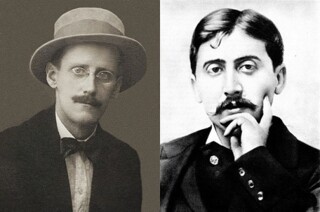Mais non, monsieur
Ben Jackson
In one of his recently published letters to his wife, Véra, Nabokov gives yet another version of the legendaryencounter between Joyce and Proust in 1922. The various accounts of the meeting (many of them collected in Richard Ellmann’s Life of Joyce) disagree on almost everything, though it probablyhappened at a party given by the writer Sydney Schiff to celebrate the opening of Stravinsky’s Renard in Paris on 18 May. According to one version of the story, Joyce arrived drunk andpoorly dressed; Proust, draped in furs, opened the door.
William Carlos Williams said in his autobiography that once Joyce and Proust were introduced to each other they launched into rivalrous accounts of their ailments:
Two chairs were placed side by side in the middle of the room. There the heroes were seated while the partisans ranged themselves right and left, waiting for the wits to sparkle and flash.
Joyce said, ‘I’ve headaches every day. My eyes are terrible.’
Proust replied, ‘My poor stomach. What am I going to do? It’s killing me. In fact, I must leave at once.’
‘I’m in the same situation,’ replied Joyce. ‘If I can find someone to take me by the arm. Goodbye!’
‘Charmé,’ said Proust. ‘Oh, my stomach, my stomach.’
Ford Madox Ford gave a similar account, complete with typos:
Two stiff chairs were obtained and placed, facing the one the other, in the aperture of a folding doorway. The faithful of Mr Joyce disposed themselves in a half-circle in one room; those of M.Proust completed the circle in the other. Mr Joyce and M. Proust sat upright, facing each other, and vertically parallel. They were incited to converse. They did.
Said M. Proust: ‘Comme j’ai dit, Monsieur, dans Du Cote de Chez Swann, que sans doute vous avez lu...’
Mr. Joyce gave a tiny vertical jump on his chair seat and said: ‘Non, monsieur.’
Then Mr. Joyce took up the conversation. He said: ‘As Mr Blum says in my Ulysses, which, Monsieur, you have doubtless read...’
Proust gave a slightly higher vertical jump on his seat. He said: ‘Mais non, monsieur.’
Service fell again to M. Proust. He apologised for the lateness of his arrival. He said it was due to a malady of the liver. He detailed clearly and with minuteness the symptoms of his illness.
‘Tiens, monsieur,’ Joyce interrupted. ‘I have almost exactly the same symptoms. Only in my case the analysis...’
So, till eight next morning, in perfect amity and enthusiasm, surrounded by the awed faithful, they discussed their maladies.
Though Joyce sometimes claimed he had never read Proust, when he did admit to passing his eyes over a few pages he declared that he did not see ‘any special talent’. The only jealousy he admittedto was of Proust’s circumstances: ‘Proust can write; he has a comfortable place at the Etoile, floored with cork and with cork on the walls to keep it quiet. And, I, writing in this place, peoplecoming in and out. I wonder how I can finish Ulysses.’
Joyce’s reports of the encounter – Proust, who died six months later, never mentioned it – take pleasure in emphasising the conversation’s vacuity but also take care to show himself in the betterlight. ‘Our conversation consisted solely of the word “no”,’ he told Frank Budgen. ‘Proust asked me if I knew the duc de so-and-so. I said, “no”. Our hostess asked Proust if he had read such andsuch a piece of Ulysses. Proust said “no”. And so on.’
Many sources agree that the evening ended with a cab ride in which Joyce was an unwelcome passenger. Ellmann suggests that Joyce opened a window and Schiff slammed it shut for fear of Proust’ssensitivity to exposure. Each of the stories of the evening is as plausible as any other, but Nabokov’s ending, perhaps the least believable, is best. The two writers say nothing to each other, noteven ‘no’:
Joyce met Proust just once, by chance; Proust and he happened to be in the same taxi-cab, the window of which the first would close and the second open – they almost quarrelled.
